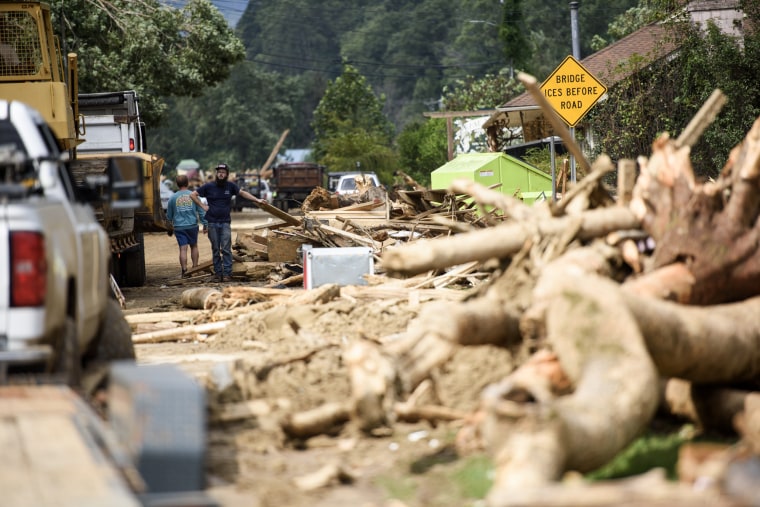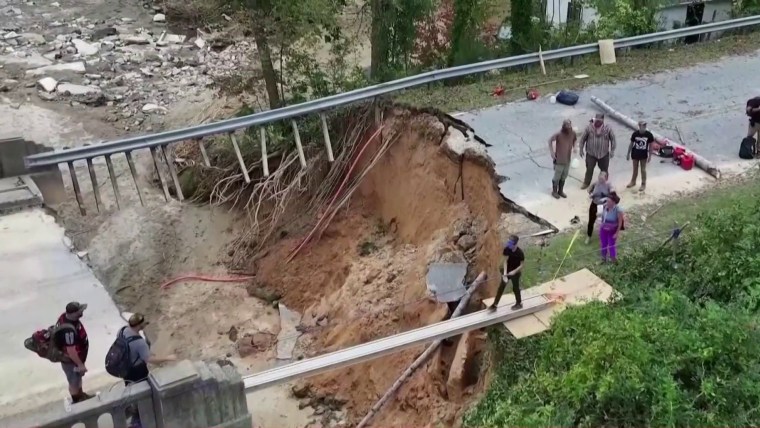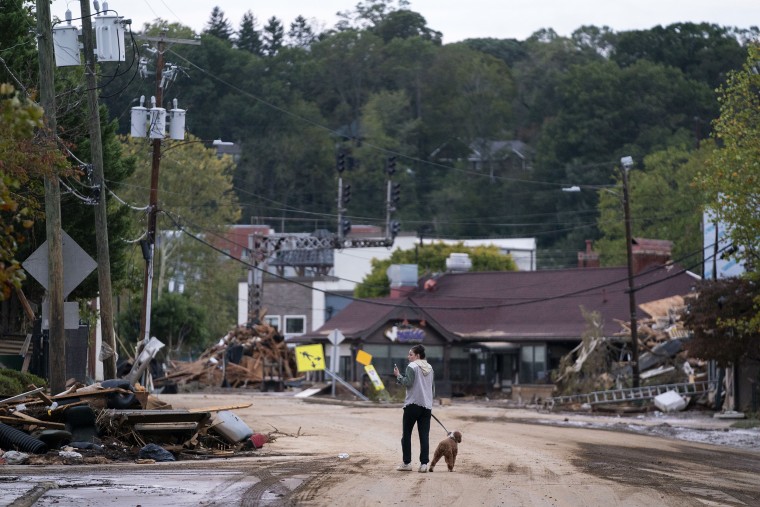lengthy lineups for gas. plenty of shelters. more than 300 closures of roads. A seriously broken water system that would need weeks to fix.
Hundreds of miles away from its impact point in Florida’s Big Bend, Hurricane Helene devastated western North Carolina, leaving dozens more people missing and at least 49 dead.
At a press conference on Monday afternoon, Governor Roy Cooper of North Carolina declared, “The devastation was beyond belief.” “And in western North Carolina, nothing like this has ever occurred, even with preparations for something similar.”
On Monday, the Federal Emergency Management Agency said that it has sent over 600,000 meals and one million liters of water to North Carolina. Over 5,000 households have gotten in touch with FEMA to submit online and phone applications for help.

More than 1,200 federal employees are currently on the ground responding to one of the worst disasters in North Carolina history, according to FEMA Administrator Deanne Criswell, who joined Cooper in Asheville on Monday. She made the commitment, “We are going to be here as long as it takes to finish this response and continue through the recovery.”
However, some locals have taken issue with what they see as inadequate planning for the devastating storm.
Asheville business owner Devonna Brown expressed her belief that the city had let its citizens down. “They ought to have been better organized. They were aware of the impending storm,” she remarked. It’s really frustrating for us. Really, there’s no way to enter and no way to exit.
Another Asheville business owner, Sara Legatski, felt that officials ought to have been more urgent and should have arrived sooner with emergency water supplies.
“People should have been urged to get ready more urgently,” she stated. “Were they stationing water off the mountain ready to be trucked up here, knowing how fragile our water system is? Nothing about this is unexpected. Someone who acts as though this is shocking hasn’t lived here long enough, isn’t from the mountains, and doesn’t know how water functions.
Requests for comment about the complaints made by citizens were not immediately answered by representatives for the city or Buncombe County, which encompasses Asheville.
Cooper said at a press conference Monday that people are working constantly to deliver food, water and help. According to him, several areas are inaccessible to first responders due to floods and steadily rising rivers.
Buncombe County Manager Avril Pinder voiced her displeasure with what she perceived as a delayed response to supply requests during a news conference earlier on Monday.
“We’ve been asking for water, and we’re just getting water, and it’s still in low quantities,” she added. “We would like to see a different response from our state partners, a better response from our state partners,” the community says in reference to the demands that are fulfilled by FEMA.
Liz Sherwood-Randall, the homeland security advisor, informed reporters during Monday’s White House briefing that FEMA concentrated its pre-positioning efforts on the Big Bend, Florida, region, and that the effort saved lives. It “surged capacity to where it was needed the most” after the landfall. She mentioned that the region most severely affected is now believed to be western North Carolina.

Representative Chuck Edwards, a Republican from western North Carolina, claimed state emergency personnel were unable to provide him with information on the whereabouts of 400 pallets of food and water that FEMA had delivered for storm assistance. Haywood and McDowell counties, in particular, are in dire need of water, according to Edwards’ staff. According to a press statement from FEMA, North Carolina received 60 trailer loads of water and 25 trailer loads of food.
They are now being distributed by state officials, but Edwards’ team claims it hasn’t been able to determine where or when they are going. By email on Sunday, a state representative informed Edwards’ team that the state is leaving any statements on the distribution of food and water up to the counties. The insider said, “We could see people actually fighting over who gets what if the public is just told water etc was dropped off at point X.”
When NBC News asked FEMA on Monday whether they knew what had happened to the water and why it wasn’t going to people who needed it the most, Criswell replied that the organization was attempting to “push water in” and “sending as many resources as they’re asking.”
“We need to work together to identify the communities that we may not have had the opportunity to reach yet and provide those resources to them,” she remarked.
The request for additional resources was sent out on September 17 and mentioned a “severe shortfall” in some disaster response teams. NBC News also questioned FEMA spokesman Jaclyn Rothenberg about this request. Rothenberg conceded that there had been a problem with personnel. “It is true that we are managing numerous missions across numerous disasters,” the spokesperson stated. Consequently, the agency issued a request for what it referred to as a “surge capacity force” in mid-September.
Survivors in North Carolina were rummaging through food and clean water and hopping from shelter to shelter on Monday, about three days after Hurricane Helene made landfall in Florida as a Category 4 hurricane.
Following a rainstorm that dumped over half a foot of rain in some areas of western North Carolina, the hurricane was downgraded to a tropical storm as it moved north. According to officials, it caused mudslides, downed trees, damaged bridges, breached roads, and left thousands without power.
State Transportation Secretary Joey Hopkins declared, “The damage is severe.” “This kind of event calls for all hands to be on deck.”
According to officials, there are still numerous telephone, electrical, and water service interruptions in Buncombe County and other western North Carolina regions.
Asheville’s water system is among the vital infrastructure that has sustained damage, according to assistant city manager Ben Woody. “The Asheville water system has suffered catastrophic damage; it is seriously compromised.”
As a result of inconsistent cellular coverage, over 11,000 people have asked for assistance in locating loved ones, according to Drew Reisinger, the register of deeds for Buncombe County. According to Reisinger, authorities have reduced the number of cases to 150 priority missing persons, the most of whom are elderly or medically dependent. Crews are being sent to residences and other locations in an attempt to locate these individuals.
Authorities from the state and the federal government reported on Monday that workers were also putting forth great effort to restore telephone service, distribute water, and fix damage to utility infrastructure and the more than 300 roads that are still closed around the state, the majority of which are in western North Carolina.
According to Pinder, workers have been giving out some bottled water to those living in public housing around Buncombe County. Additionally, water distribution facilities were being set up independently on Monday. Handouts were limited to one day’s supply, or around three gallons, per individual by officials.
Pinder stated that prior to the storm last week, the county had made requests for water and other supplies in an attempt to prevent a water crisis.
Pinder stated, “We asked for water even before the storm started because we knew that, not that it was going to fail, but that people could have extra.” “We felt that some people would be cut off because of how much rain was coming, so we were asking for food, we were asking for anything.”
According to Pinder, the state receives these requests and uses FEMA’s assistance to fulfill them. Buncombe County received its first supply of water around 2:30 a.m. on Monday, Pinder said, despite the earlier requests.
When asked if the county had water reserves of its own for situations like these, Pinder admitted that it didn’t.
She declared, “There isn’t a county stockpile.” She stated that although the county depends on contractors for its water reserves, “the Swannanoa River kind of made them isolated to us and we could not get to that stockpile” prevented it from quickly accessing water from its main local source, which it usually turns to in an emergency.
Cooper gave citizens reassurance at the press conference that the state was making every effort to address their unmet needs. “We want to let people know that there will be more assistance coming,” he stated. “At this time, helping this area is our primary goal, and it is being done in a very coordinated manner.”






